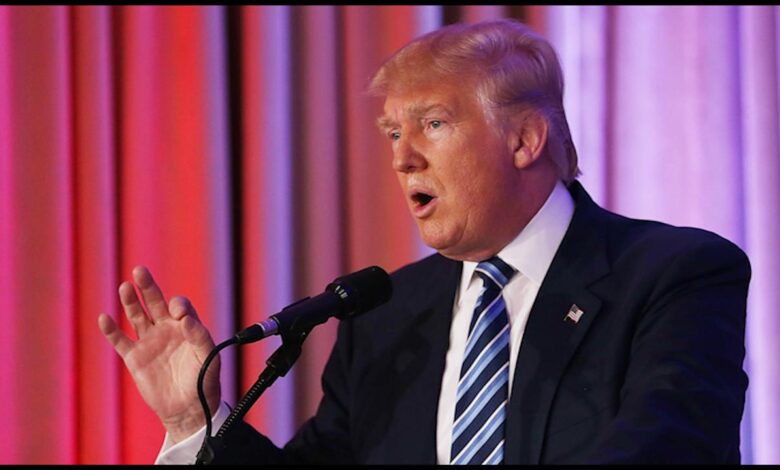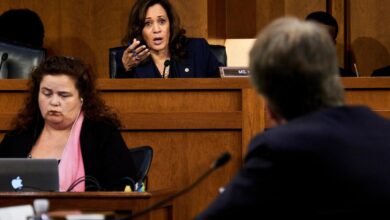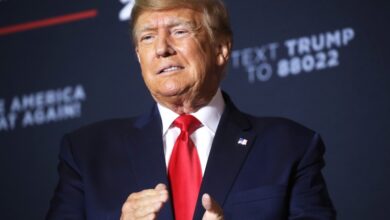
Will the Kamala Harris-Trump Debate Matter?
Will the debate between Kamala Harris and Donald Trump matter? That’s the million-dollar question, isn’t it? This potential clash of political titans promises to be a spectacle, a whirlwind of policy pronouncements, sharp retorts, and maybe even a few unexpected moments. But beyond the drama, the real question is: will this debate actually shift the needle? Will it sway undecided voters, energize the bases, or simply reinforce pre-existing opinions?
We’ll dive into the potential impact on voter turnout, shifts in public opinion, and the strategic maneuvering we can expect from both candidates. Get ready for a deep dive into the potential ramifications of this highly anticipated showdown.
This isn’t just about soundbites and memorable moments; it’s about how the debate might shape the final weeks of the election cycle. We’ll explore the historical context of past debates, analyzing how they’ve influenced voter behavior and public perception. We’ll examine the communication styles of Harris and Trump, predicting how their approaches might play out on the debate stage and the potential impact on different voter demographics.
Ultimately, we aim to assess whether this debate could be a pivotal moment in the election or just another chapter in the ongoing political narrative.
Potential Impact on Voter Turnout
A highly anticipated debate between Kamala Harris and Donald Trump could significantly impact voter turnout, particularly within specific demographic groups and among undecided voters. The intensity of the political climate and the candidates’ contrasting personalities and policy positions will likely drive engagement, but the extent of this influence remains to be seen. Analyzing historical trends and considering potential scenarios can help us understand the potential effects.The energy generated by a high-profile debate can mobilize voters who might otherwise remain apathetic.
For example, a particularly compelling or controversial exchange could energize supporters of both candidates, leading to increased enthusiasm and participation in the election. Conversely, a perceived lackluster performance from either candidate could depress turnout among their respective bases.
Debate’s Influence on Key Demographics
The impact of a Harris-Trump debate will likely vary across different demographic groups. Historically, debates have shown a greater influence on younger voters and those with less political experience. A dynamic and engaging debate could incentivize younger voters, often characterized by lower turnout rates, to participate more actively. Conversely, a debate perceived as overly negative or unproductive might alienate some segments of the population, potentially suppressing turnout.
Will the Harris-Trump debate truly sway undecided voters? Honestly, I’m not sure. It feels like the larger issues, like the gut-wrenching reality of gun violence as highlighted by Trey Gowdy’s emotional response in this article, trey gowdy gets emotional responding to mass shootings right to bear arms doesnt matter if youre dead , are overshadowing the political sparring.
Ultimately, will the debate matter more than the pervasive sense of national unease? That’s the real question.
For example, a debate dominated by personal attacks might discourage voters who prioritize respectful political discourse. On the other hand, a detailed policy discussion might energize voters highly invested in specific policy areas. The age and political experience of voters often dictate their responsiveness to debate performances.
Impact on Undecided Voters and Participation
Undecided voters represent a crucial segment of the electorate, and their participation can be significantly swayed by debate performances. A strong performance from one candidate could solidify the undecided voter’s preference and motivate them to participate in the election. For example, if a candidate effectively addresses concerns about the economy or healthcare, it could sway undecided voters leaning toward that candidate to actively cast their ballots.
Conversely, a weak or unconvincing performance could lead to disillusionment and potentially lower participation among undecided voters. The clarity and persuasiveness of a candidate’s arguments will play a pivotal role in influencing this group.
Will a Harris-Trump debate even matter? Honestly, I’m more interested in seeing how their legal teams might fare, given the potential for legal challenges down the line. You can check out the relevant information on the various court systems via these helpful us court website links , which are surprisingly useful for tracking potential cases.
Ultimately, the debate’s impact will probably depend more on the legal ramifications than any single soundbite.
Historical Effects of Presidential and Vice-Presidential Debates
Analyzing historical data on voter turnout following presidential and vice-presidential debates reveals mixed results. Some debates have demonstrably increased voter turnout, while others have had little to no discernible impact. The impact often depends on factors such as the closeness of the election, the candidates’ perceived strengths and weaknesses, and the overall political climate. For instance, the 1960 Kennedy-Nixon debates are often cited as a turning point in the use of television in presidential campaigns, potentially influencing voter turnout.
However, not all debates have had such a pronounced effect. The impact of a vice-presidential debate is generally less pronounced than that of a presidential debate, but can still influence turnout within specific demographics or in close elections.
Hypothetical Scenario Illustrating Debate’s Sway on Voter Decisions
Let’s imagine a scenario where Trump aggressively attacks Harris’s policy positions, while Harris maintains a calm, fact-based demeanor, effectively refuting his claims. This scenario could lead to several outcomes. Trump’s supporters might feel energized by his aggressive style, increasing their likelihood of voting. However, undecided voters who value composure and reasoned arguments might be swayed toward Harris, increasing their turnout.
Conversely, if Harris falters under pressure or delivers a lackluster performance, undecided voters might shift their support toward Trump, or become discouraged and less likely to vote. The outcome is highly dependent on the viewers’ pre-existing biases and their evaluation of the candidates’ performances. The effectiveness of a candidate’s message delivery and their ability to connect with the audience will directly affect the voter’s decisions.
Shifting Public Opinion
Presidential debates, while often spectacles of political theater, can genuinely impact public opinion. The extent of this influence varies depending on several factors, including the candidates’ performance, pre-existing biases, and the subsequent media coverage. Analyzing past debates helps us understand the potential for a Harris-Trump debate to sway voters.Pre- and post-debate polling data frequently reveal shifts in candidate favorability.
For example, the first 2012 presidential debate between Barack Obama and Mitt Romney showed a noticeable increase in positive sentiment towards Obama following the debate, according to various polls conducted by organizations like Gallup and Pew Research Center. These shifts, while not always dramatic, can be statistically significant, particularly among undecided voters. Conversely, debates can also solidify existing opinions, making it harder to persuade voters already committed to a particular candidate.
Impactful Debate Moments and Public Perception, Will the debate between kamala harris and donald trump matter
Specific moments in past debates have profoundly shaped public perception. Consider the 1980 debate between Ronald Reagan and Jimmy Carter. Reagan’s simple, direct response to a question about his economic policies – “There you go again” – is often cited as a turning point. This memorable phrase, capturing Reagan’s perceived authenticity and confidence, contributed to a shift in public opinion in his favor.
Similarly, a candidate’s gaffe or a particularly strong rebuttal can dramatically alter the narrative surrounding their campaign. These “viral moments” are amplified by social media, extending their reach and influence far beyond the immediate audience of the debate itself.
Communication Styles and Public Opinion
Different communication styles significantly affect how the public perceives candidates. A candidate who comes across as calm, collected, and well-prepared might gain credibility and trust. Conversely, a candidate who appears aggressive, evasive, or unprepared can lose ground. Body language, tone of voice, and the ability to connect with the audience on an emotional level all play a crucial role.
A candidate’s use of persuasive techniques, such as appeals to logic, emotion, or authority, also influence public opinion. For example, a candidate who effectively uses pathos (emotional appeal) might connect more strongly with undecided voters than a candidate relying solely on logos (logical appeal).
Media Coverage and Opinion Shaping
Post-debate media coverage plays a vital role in shaping public opinion. News outlets, commentators, and social media influencers frame the debate, highlighting certain moments and interpreting the candidates’ performances. The dominant narrative presented by the media can significantly influence how the public interprets the debate’s outcome. For example, if major news organizations focus on a particular candidate’s perceived gaffe, this might negatively impact their public image, even if other aspects of their performance were strong.
The selective framing of the debate by different media outlets, often reflecting their pre-existing political biases, can lead to vastly different interpretations of the same event among various segments of the population.
Debate Strategies and Tactics: Will The Debate Between Kamala Harris And Donald Trump Matter

A presidential debate is a high-stakes performance, a carefully choreographed battle of words and ideas. Both Kamala Harris and Donald Trump will undoubtedly employ specific strategies designed to exploit their strengths and mitigate their weaknesses. Understanding these strategies is key to predicting the debate’s trajectory and its potential impact on the electorate.
Candidate Strengths and Weaknesses
Kamala Harris’s strength lies in her legal background and her ability to articulate complex policy positions with clarity. However, she sometimes comes across as overly cautious or overly prosecutorial. Donald Trump’s strength is his undeniable charisma and his ability to connect with his base. His weakness, however, is his tendency towards rambling, unsubstantiated claims, and personal attacks. To counter this, Harris might focus on factual accuracy and policy details, while Trump might try to dominate the conversation and appeal to emotions rather than logic.
Communication Styles and Predicted Debate Dynamics
Harris’s communication style is generally measured and deliberate, favoring detailed explanations and evidence-based arguments. Trump’s style, on the other hand, is often impulsive, aggressive, and punctuated by interruptions and personal attacks. This stark contrast in communication styles will likely lead to a dynamic debate, potentially characterized by clashes and interruptions. We might see Harris attempting to maintain a calm demeanor while Trump attempts to disrupt her flow.
The moderator’s role in managing these interruptions will be crucial. Past debates featuring Trump have shown a clear pattern of him attempting to dominate the conversation, regardless of the rules or the moderator’s attempts to maintain order. This could lead to a chaotic exchange, where Harris’s measured approach may be challenged by Trump’s aggressive tactics.
Hypothetical Debate Scenario
Imagine a question about the economy. Harris might respond with a detailed explanation of her economic plan, citing specific data points and emphasizing its benefits for working families. Trump, in contrast, might launch into a personal attack, questioning Harris’s qualifications or accusing her of supporting policies that hurt the American people. He might then pivot to his own accomplishments, regardless of their factual basis or relevance to the question.
This scenario illustrates the potential for vastly different approaches to handling difficult questions: a reasoned, policy-focused response versus a combative, emotionally charged counter-attack.
Anticipated Debate Strategies
| Candidate | Likely Talking Points | Strengths to Emphasize | Weaknesses to Mitigate |
|---|---|---|---|
| Kamala Harris | Economic policy, social justice, foreign policy experience | Legal expertise, policy knowledge, calm demeanor | Perception of being overly cautious, avoiding direct confrontation |
| Donald Trump | Economic growth under his presidency, strong stance on immigration, “America First” | Charisma, connection with his base, ability to dominate conversation | Tendency towards personal attacks, lack of factual accuracy, rambling responses |
Focus on Specific Policy Issues
A vice-presidential debate between Kamala Harris and Donald Trump would inevitably delve into key policy areas shaping the American electorate’s choices. The candidates’ approaches to these issues, and how effectively they communicate their stances, will significantly impact public perception and potentially sway undecided voters. The economy, healthcare, and foreign policy are likely to dominate the discussion, offering a platform for both candidates to showcase their policy expertise and leadership qualities.The debate’s impact on public perception of each candidate’s policy positions will be substantial.
A strong performance could solidify existing support and attract undecided voters, while a weak showing could damage credibility and lead to a loss of momentum. Conversely, a compelling articulation of policy proposals can resonate with voters seeking clear and decisive leadership. The effectiveness of their communication strategies, including the use of data, anecdotes, and persuasive rhetoric, will be crucial in shaping public opinion.
Economic Policies
The economy is a perennial battleground in American politics, and this debate will likely see extensive discussion on economic growth, job creation, inflation, and fiscal responsibility. We can anticipate contrasting approaches. For example, Trump might emphasize tax cuts and deregulation as catalysts for economic growth, while Harris might advocate for investments in infrastructure and social programs to stimulate the economy and address income inequality.
The debate’s effect on voters will depend on which economic vision resonates most strongly with their personal circumstances and priorities. A persuasive presentation of a plan to address inflation, for instance, could sway undecided voters concerned about rising costs.
Honestly, will the Harris-Trump debate really sway many votes? I’m more preoccupied with the news that, according to reports, elon musk to begin twitter layoffs friday morning reports , which makes me wonder if anyone will even see the debate coverage amidst the Twitter chaos. It feels like the debate’s impact is overshadowed by the larger, more immediate tech world drama.
Healthcare Policies
Healthcare is another highly divisive issue. We can expect a detailed examination of the Affordable Care Act (ACA), Medicare for All proposals, and the rising cost of healthcare. Harris might defend and expand upon the ACA, highlighting its successes and proposing further reforms to lower costs and improve access. Trump, on the other hand, might reiterate his focus on market-based solutions and deregulation, arguing for increased competition to drive down costs.
The effectiveness of their arguments will depend on their ability to address voter concerns about affordability, quality of care, and access to healthcare services. A strong defense of a specific healthcare plan could significantly impact voters’ perceptions of the candidates’ commitment to their well-being.
Foreign Policy Approaches
Foreign policy is likely to feature prominently, particularly given current global events. The candidates’ stances on issues such as the war in Ukraine, relations with China, and the role of the United States in international affairs will be scrutinized. Harris might emphasize diplomacy and multilateralism, highlighting the importance of international cooperation. Trump, known for his “America First” approach, might reiterate his preference for unilateral action and renegotiating existing international agreements.
The handling of this topic will likely influence voters’ perceptions of the candidates’ leadership abilities and their vision for America’s role on the world stage. For example, a strong and clear articulation of a strategy for dealing with a specific international crisis could significantly bolster a candidate’s image as a decisive leader.
Visual and Emotional Impact

The visual and emotional aspects of a debate can often be as impactful, if not more so, than the policy arguments presented. Body language, facial expressions, and even the candidates’ stage presence contribute significantly to how viewers perceive them and ultimately, how they vote. Emotional appeals, while sometimes criticized, can be incredibly persuasive, tapping into deeply held values and beliefs that transcend mere policy specifics.The effectiveness of visual and emotional communication in political debates is well-documented.
Candidates who project confidence, empathy, and authenticity tend to fare better than those who appear stiff, evasive, or disengaged. Conversely, overly emotional displays can backfire, appearing inauthentic or even unhinged to viewers. The delicate balance between projecting genuine emotion and maintaining composure is crucial for success.
Body Language and Facial Expressions
A candidate’s posture, hand gestures, and eye contact speak volumes. Consider the famous 1960 Kennedy-Nixon debate: while Nixon’s appearance, hampered by illness and a poor choice of makeup, projected an image of weakness, Kennedy’s confident posture and direct gaze conveyed strength and conviction. This visual impact resonated strongly with television viewers, potentially influencing the election’s outcome. Similarly, a candidate’s facial expressions – a genuine smile, a furrowed brow conveying concern, or a look of frustration – can dramatically shape audience perception of their honesty and sincerity.
Microexpressions, fleeting changes in facial expression, can also betray underlying emotions, adding another layer of visual communication that discerning viewers might pick up on.
Emotional Appeals and Their Resonance
Emotional appeals tap into the audience’s values, fears, and aspirations. Appeals to patriotism, family values, economic security, or fear of the “other” are frequently used in political debates. A candidate effectively utilizing such appeals can connect with voters on a deeper level, bypassing rational argumentation and forging a powerful emotional connection. For example, a candidate expressing genuine empathy for struggling families or articulating a clear vision for a brighter future can evoke powerful emotional responses that influence voters’ choices.
However, overly manipulative emotional appeals can backfire, making the candidate appear insincere or even manipulative.
Examples from Past Debates
The 2012 presidential debate between Barack Obama and Mitt Romney provides a good example. Obama’s calm demeanor and measured responses, contrasted with Romney’s sometimes aggressive and overly assertive style, resonated with many viewers. Obama’s ability to project empathy and understanding, particularly in discussions about the economy, created a positive emotional connection with a significant portion of the electorate.
Conversely, Romney’s frequent interruptions and assertive tone were perceived by some as aggressive and dismissive. This visual contrast significantly impacted public opinion.
A Powerful Moment: A Hypothetical Scenario
Imagine a moment in the Harris-Trump debate where a question arises about the economy. Trump, employing a confident, almost boastful tone, attempts to portray a rosy economic picture. Harris, however, counters with a detailed account of the struggles faced by ordinary Americans, using statistics to support her claims. As she speaks, her facial expression shifts from a neutral stance to one of genuine concern, her voice softening as she relates personal anecdotes of struggling families she’s met.
The camera focuses on her face, capturing the sincerity of her emotion. Trump, visibly uncomfortable, attempts to interrupt, but Harris maintains her composure and finishes her point, her gaze locking directly with the camera, making a direct connection with the viewers at home. This visual and emotional contrast – Trump’s bluster versus Harris’s empathy – could create a powerful moment that resonates deeply with voters, potentially swaying public opinion in her favor.
Role of the Moderator and Media

The upcoming Harris-Trump debate hinges not only on the candidates’ performances but also on the crucial roles played by the moderator and the subsequent media coverage. The moderator acts as a gatekeeper, influencing the flow of the discussion and shaping the public’s perception of the candidates’ arguments. Simultaneously, the media interprets and disseminates the debate’s key moments, profoundly impacting voter understanding and shaping the overall narrative.The moderator’s responsibility extends beyond simply asking questions.
Their ability to fairly manage the time allotted to each candidate, to interject when necessary to clarify points or prevent interruptions, and to steer the discussion toward substantive policy issues is paramount. A biased or ineffective moderator can significantly skew the debate’s trajectory, leaving one candidate with more opportunities to articulate their views than the other. This imbalance can have a lasting impact on public opinion, potentially swaying undecided voters.
Moderator’s Influence on Debate Flow
The moderator’s questioning style directly impacts the debate’s focus. For example, a series of questions focused heavily on a candidate’s past statements could overshadow their policy proposals, while a more balanced approach would allow for a more comprehensive discussion of the issues. Similarly, a moderator’s decision to allow or prevent interruptions can significantly alter the dynamic of the exchange, affecting how each candidate is perceived by the audience.
Consider the 2016 presidential debates: the moderators’ approaches, whether perceived as too lenient or too forceful, directly influenced how viewers interpreted the candidates’ interactions.
Media’s Interpretation and Shaping of Public Opinion
Media coverage following a debate is arguably as important as the debate itself. News outlets, through their choice of headlines, soundbites, and analysis, shape the public narrative. They select specific moments to highlight, often emphasizing emotionally charged exchanges or controversial statements over more nuanced policy discussions. This selective framing can significantly impact how viewers remember and interpret the debate.
Examples of Media Impact on Past Debates
The 2012 presidential debate between Barack Obama and Mitt Romney provides a compelling example. While some analysts pointed to Obama’s stronger performance on policy, post-debate media coverage focused heavily on Romney’s perceived gaffes and aggressive demeanor. This emphasis arguably contributed to the perception that Obama “won” the debate, despite a more balanced assessment of their performances. Similarly, the 2020 presidential debates saw significant media scrutiny of the candidates’ fact-checking and interruptions, shaping public perception of the debates’ overall tone and substance.
Potential Post-Debate Media Narratives and Effects
The media’s influence on voter perception will be crucial in shaping the outcome of the Harris-Trump debate. Here are some potential post-debate narratives and their potential effects:
- Narrative: “Harris Dominated the Debate with Fact-Based Arguments.” Effect: Could boost Harris’s standing among undecided voters and solidify support among her base.
- Narrative: “Trump’s Aggressive Tactics Overshadowed Substantive Policy Discussion.” Effect: Could damage Trump’s image among moderate voters and reinforce negative perceptions among his detractors.
- Narrative: “Debate Highlights Stark Differences on Key Issues.” Effect: Could increase voter turnout as the debate clarifies the candidates’ positions and motivates voters to choose a side.
- Narrative: “Debate Marked by Personal Attacks and Few Policy Substantives.” Effect: Could discourage voters, leading to decreased turnout and a sense of disillusionment with the political process.
- Narrative: “Moderator’s Bias Favored One Candidate.” Effect: Could erode public trust in the debate process and the media’s impartiality, potentially leading to decreased voter confidence.
So, will the Harris-Trump debate matter? The answer, ultimately, is complex. While it’s unlikely to completely reshape the electorate overnight, the debate holds significant potential to influence undecided voters and energize existing supporters. The candidates’ performances, the moderator’s role, and the subsequent media coverage will all play crucial roles in shaping public perception. The debate’s impact will be felt not just in immediate polling shifts, but also in the overall narrative surrounding the election in its final stretch.
It’s a high-stakes event, and its legacy will likely be debated long after the final gavel falls.



